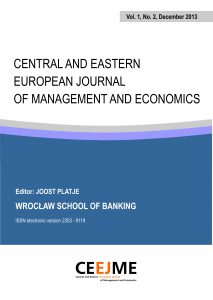 CENTRAL AND EASTERN EUROPEAN JOURNAL OF MANAGEMENT AND ECONOMICS
CENTRAL AND EASTERN EUROPEAN JOURNAL OF MANAGEMENT AND ECONOMICS
ISSN electronic version 2353 – 9119
Vol. 1, No. 2, December 2013, WROCŁAW SCHOOL OF BANKING
Editor: Joost Platje
Contents: PDF download >>
Editorial: PDF download >>
Cover: PDF download >>
Vol. 1, No. 2, 123-140, December 2013
Survival analysis: a case study of micro and small enterprises in Dolnoslaskie and Opolskie Voivodship (Poland)
Authors:
Krzysztof ŁOBOS, Opole School of Banking, Poland
Mirosława SZEWCZYK, Opole University of Technology, Poland
Article: PDF download >>
Abstract: The aim of the study is to achieve initial recognition of the factors that determine the survival rate of Polish micro and small enterprises. The research, conducted in June 2011 and covering a sample of 147 entities, constitutes a pilot study. We explore the determinants of companies’ survival and test whether firms with different characteristics exhibit different performances in terms of the duration of survival. The results indicate substantial differences in the survival rates. The factors taken into account in this study, which to the greatest extent possibile differentiates the whole sample in view of survival, are: running the business with employees or alone and specialist vs. popular activity as regards the required competences. Larger firms (with employees) are significantly less likely to close than smaller firms. Firms in highly competitive markets are more prone to closure.
Keywords: micro and small enterprises, Poland, survival analysis.
Vol. 1, No. 2, 141-153, December 2013
Purchase decision making in Polish households against survey results
Author: Stefan FORLICZ, Wrocław School of Banking, Poland
Article: PDF download >>
Abstract: In this article, the author has attempted to analyse the problem of making purchase decisions concerning both everyday consumables, such as food, beverages, household chemicals, cosmetics, etc., and durable goods (real properties, cars, furniture, audio/video devices and household appliances) in the Polish households. They are of ten made independently by a single person representing the given household, and to a certain extent, they also constitute an outcome of the arrangements between the household members. Therefore, the main point of the study was to determine whether the consumption structure in the Polish households develops according to the traditional model as assumed by the neo-classical economics, or if a democratic model starts to prevail. Another issue studied was the influence of the most significant demographic characteristics, such as sex, age, education, social group or place of residence, on the manner in which the said decisions are made. It seems that the survey results analysed are sufficient grounds for claiming that the democratic model of the purchase decision making, with regard to both the everyday shopping and buying of durable goods, will gradually become more and more popular in the Polish households primarily due to predominance of this model in younger households.
Keywords: household, decision making, purchasing.
Vol. 1, No. 2, 155-164, December 2013
Trends in the stock market and their price forecasting using artificial neural networks
Authors:
Agata STRZELCZYK, Wrocław School of Banking, Poland
Artur STRZELCZYK, Wrocław School of Banking, Poland
Article: PDF download >>
Abstract: The article is devoted to the research of market trends in order to forecast stock prices on the basis of neuron networks. To demonstrate such a possibility the authors propose three networks for each considered trend. The article demonstrates that neuron networks can be an effective way to predict the market prices of shares.
Keywords: artificial neuron networks, stock exchange, market trends, GRW.
Vol. 1, No. 2, 165-175, December 2013
European regional policy and its implementation in Poland in 2007-2013
Author: Kazimiera WILK, Wrocław School of Banking, Poland
Article: PDF download >>
Abstract: This article aims to discuss the objectives and instruments of the European regional policy with particular reference to the current period of its programming. Programming is a particular feature of the implementation of the Community policy, therefore this study is also intended to present a short overview of the programming of this policy in Poland. The main information about the existence and evolution of European regional policy is presented. Special attention is given to its political programming (tasks and spheres of financial intervention), especially budget programming. The main purposes of solidarity policy in Poland are presented. Its programming tools chich are implemented according to the main document, which characterises directions of financial support from the EU, are given. This document entitled the National Strategic Frames presents a diagnosis of the social and economic situation of the country and the intentions of its regions towards development of solidarity. It contains a chapter about financial resources sharing according to operation programs as well as a description of the realization system.
Keywords: regional policy, financial tools for regional policy, structural funds, solidarity fund, operation programs.
Vol. 1, No. 2, 177-193, December 2013
The financial situation of Polish households – an assessment
Author: Tomasz RÓLCZYŃSKI, Wrocław School of Banking, Poland
Article: PDF download >>
Abstract: Important participants in the financial market are households, which are becoming wealthier; and financial institutions provide products especially for them. Individual clients are an important group for both investors and borrowers, creating the necessity of making an analysis of their financial situation. The purpose of the article is to present the financial situation of Polish households at the end of the first decennium of the 21st century and an assessment is attempted.
Keywords: household, financial situation, financial market, debts, investments, profits and costs of households.
